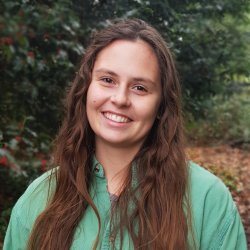
Dr Aimee Sweeney
Academic and research departments
Advanced Technology Institute, Leverhulme Quantum Biology Doctoral Training Centre (QB-DTC), Faculty of Engineering and Physical Sciences.About
My research project
Highly efficient photon absorption in the retinaRetina cells demonstrate the amazing capability of single-photon detection, pointing at the ability of biological photoreceptors to exhibit quantum mechanical properties at room temperature and normal atmospheric pressure, in a ‘noisy’ biological environment. In the human retina, photo transduction is an enormously efficient process, involving multi-wavelength photon absorption by different rod and cone cells and signal transfer through neurons towards the optical nerve. Several quantum processes have been suggested as mechanisms, contributing to the remarkable speed and efficiency of photoisomerization and subsequent signal transduction, including quantum coherence, superposition, and tunnelling in retina cells. Mimicking these processes with bio-compatible, synthetic organic molecular systems will provide pathways for a deeper understanding.
This project studies the use of naturally occurring chromophores isolated from the juice of different fruits and vegetables, for studies of their photoresponses in stimulated bio-environments when their peak absorption matches that of human eye rods and cones. A simplified model of the eye is being used to investigate is such chromophores can induce depolarisation effects to stimulate retina neuron depolarisation. The construction of a full colour response prosthetic retina ultra-flexible device will be attempted to investigate the feasibility of vision restoration. The study will also suggest strategies for the fabrication of single-photon bio-inspired molecular detectors that could help to increase the efficiency of solar cells.
Supervisors
Retina cells demonstrate the amazing capability of single-photon detection, pointing at the ability of biological photoreceptors to exhibit quantum mechanical properties at room temperature and normal atmospheric pressure, in a ‘noisy’ biological environment. In the human retina, photo transduction is an enormously efficient process, involving multi-wavelength photon absorption by different rod and cone cells and signal transfer through neurons towards the optical nerve. Several quantum processes have been suggested as mechanisms, contributing to the remarkable speed and efficiency of photoisomerization and subsequent signal transduction, including quantum coherence, superposition, and tunnelling in retina cells. Mimicking these processes with bio-compatible, synthetic organic molecular systems will provide pathways for a deeper understanding.
This project studies the use of naturally occurring chromophores isolated from the juice of different fruits and vegetables, for studies of their photoresponses in stimulated bio-environments when their peak absorption matches that of human eye rods and cones. A simplified model of the eye is being used to investigate is such chromophores can induce depolarisation effects to stimulate retina neuron depolarisation. The construction of a full colour response prosthetic retina ultra-flexible device will be attempted to investigate the feasibility of vision restoration. The study will also suggest strategies for the fabrication of single-photon bio-inspired molecular detectors that could help to increase the efficiency of solar cells.
My qualifications
Publications
For the prosthetic retina, a device replacing dysfunctional cones and rods, with the ability to mimic the spectral response properties of these photoreceptors and provide electrical stimulation signals to activate residual visual pathways, can relay sufficient data to the brain for interpretation as color vision. Organic semiconductors including conjugated polymers with four different bandgaps providing wavelength-specific electrical responses are ideal candidates for potential full-color vision restoration. Here, conjugated polymer photocapacitor devices immersed in electrolyte are demonstrated to elicit a photovoltage measured by a Ag/AgCl electrode 100 microns from the device of ≈−40 mV for 15–39 µW mm−2 of incident light power density at three wavelengths: 405 nm for blue photoreceptor candidate material, 534 nm for green, 634 nm for red. Photoresponse is substantially improved by introducing polymer donor/acceptor molecules bulk heterojunctions. Devices with bulk heterojunction configurations achieved at least −70 mV for green candidates with the highest at −200 mV for red cone candidates. These findings highlight the potential for organic materials to bridge the gap toward natural vision restoration for retinal dystrophic conditions such as age-related macular degeneration, Stargardt disease, or retinitis pigmentosa and contribute to the ongoing advancements in visual prosthetic devices.